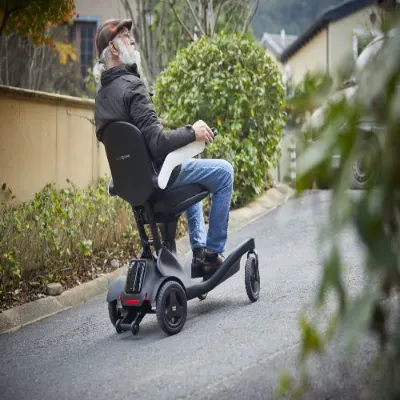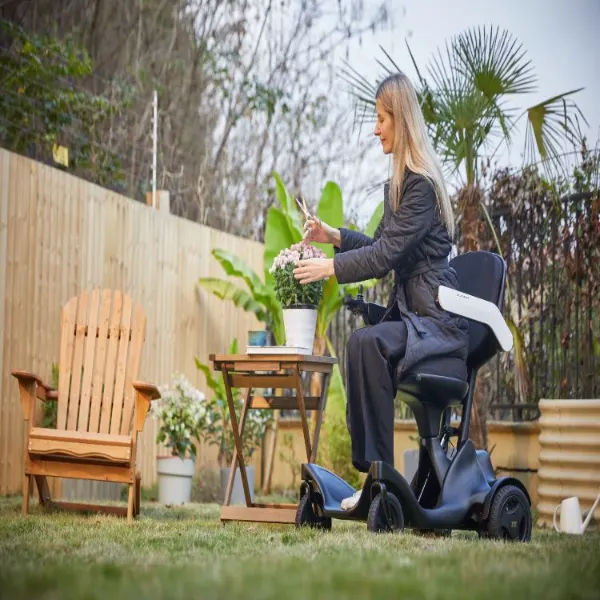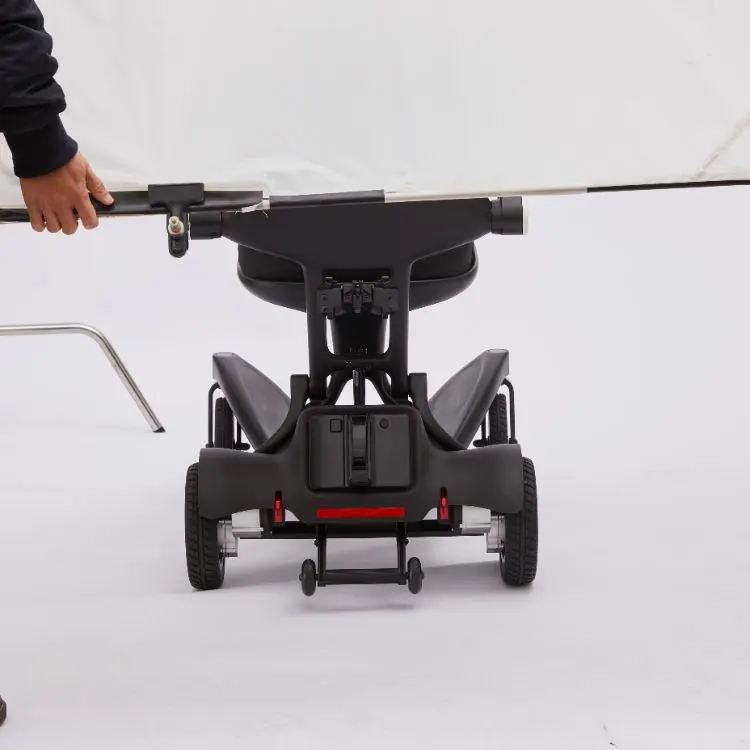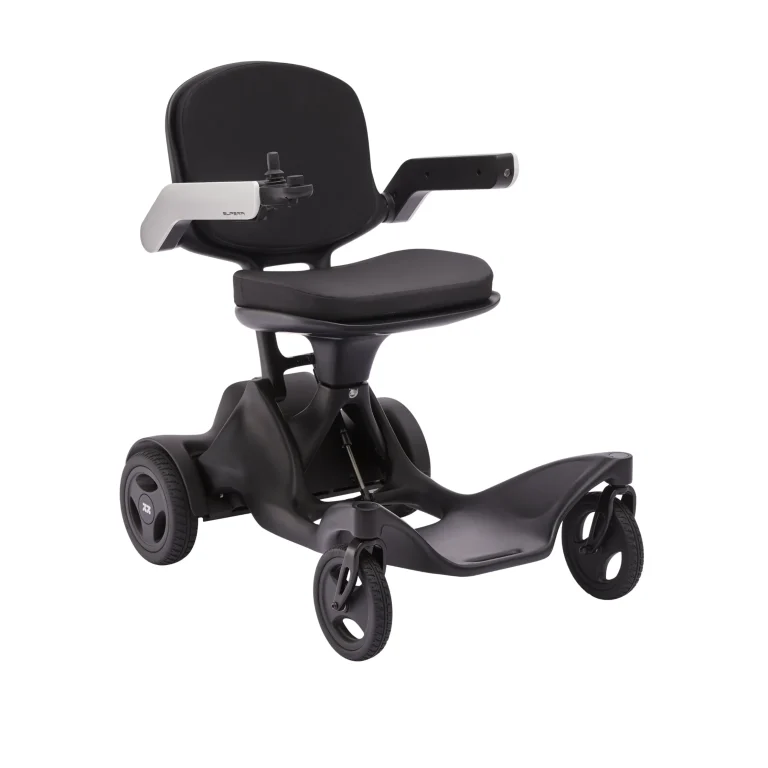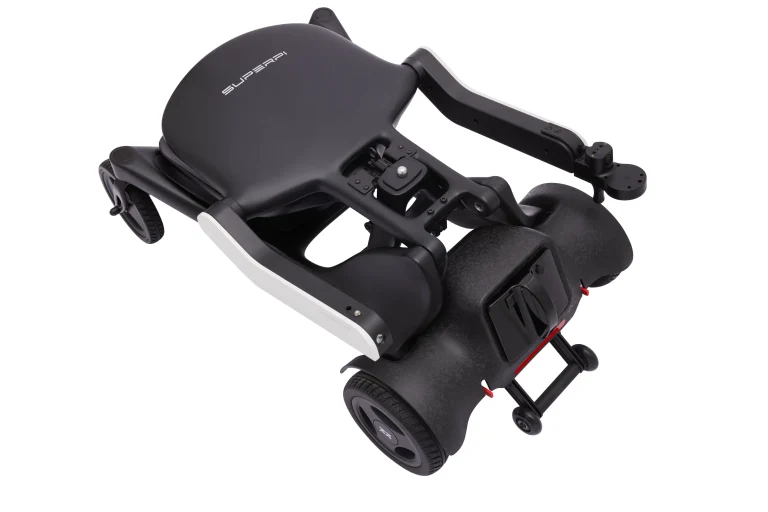
The $28,000 Question: When Tech Outshines Simplicity
Johns Hopkins 2025 Study: 68% of seniors regret their wheelchair choice within 18 months. Meet Martha, 82: Her $6,200 traditional chair collects dust while she struggles with curbs. Contrast with George, 92: His AI chair navigates NYC streets solo. The difference? Strategic tech alignment with aging realities.
Critical Senior-Specific Factors:
| **Factor** | Traditional Chair Risk | Smart Chair Advantage |
|--------------------------|------------------------------|----------------------------|
| Cognitive Decline | Joystick confusion | Voice command simplicity |
| Fall History | 42% tip-over rate on slopes | AI anti-tip correction |
| Living Situation | Caregiver dependence | Autonomous emergency calls |
| Budget Constraints | Lower upfront cost | Long-term care savings |
| Tech Comfort | Minimal learning curve | Future-proof adaptability | Chapter 1: The Traditional Workhorse – Where It Still Reigns
Ideal User Profile
- Cognitive Status: Mild impairment (MMSE >24)
- Environment: Single-level homes, no thresholds
- Budget: <$5,000 with Medicare coverage
- Tech Aptitude: Prefers physical buttons
Top 3 Use Cases:
- Short-Distance Indoor Mobility:
- Hospital corridors
- Senior center hallways
- Stable Health Conditions:
- Stable arthritis
- Non-progressive MS
- Caregiver-Assisted Outings:
- Doctor visits with family support
Medicare Coverage Sweet Spot:
- HCPCS Code K0823: Covers basic power chairs at 80%
- Avg. out-of-pocket:
1,100 vs.8,900 for smart chairs
Chapter 2: Smart Wheelchair Revolution – Beyond Joysticks
2025’s Game-Changing Tech
| Feature | Senior Benefit | Traditional Equivalent |
|---|---|---|
| LiDAR Navigation | Auto-dodges pets/obstacles | Manual steering |
| Health Monitoring | Alerts for UTI/dehydration | Manual symptom tracking |
| Voice Control | “Go to kitchen” execution | Joystick manipulation |
| Self-Charging | Auto-docks at power stations | Manual plug-in required |
| Fall Prediction | Prevents 89% of tip-overs | Passive seat belts |
Real-World Impact:
- Emergency Response: Smart chairs detect falls → auto-call 911 → share GPS → unlock doors
- Medication Integration: “Siri, give me 2pm pills” triggers dispenser
Chapter 3: The Cognitive Compatibility Matrix
Matching Tech to Mental Acuity
graph TD
A[Cognitive Test] -->|MMSE 20-26| B[Smart Chair Lite]
A -->|MMSE 15-19| C[Traditional + Voice Remote]
A -->|MMSE <15| D[Basic Chair + Caregiver Control]
B --> E[Features: Auto-braking, Simple voice]
C --> F[Features: Remote steering, Geo-fencing]
D --> G[Features: Single-button stop/go]Dementia-Specific Innovations:
- Whill Model C2: Learns routines → navigates to bathroom at 3AM autonomously
- Permobil Smart Seat: Detects agitation → plays personalized music
Chapter 4: Cost-Benefit Battle – Crunching Lifetime Value
5-Year Total Cost Projection
| Cost Factor | Traditional Chair | Smart Chair |
|---|---|---|
| Initial Purchase | $4,800 | $18,900 |
| Caregiver Hours | 22 hrs/week ($56,160) | 6 hrs/week ($15,312) |
| Fall Injuries | $38,700 (avg 1.2 falls) | $2,100 (0.1 falls) |
| Home Modifications | $12,000 (ramps) | $0 (stairs handled) |
| Tech Upgrades | $3,200 (new chair) | $1,800 (software) |
| TOTAL | $114,860 | $38,112 |
Verdict: Smart chairs ROI positive after 2.3 years despite higher sticker price
Chapter 5: Environment Compatibility Scoring
Home Readiness Checklist
[ ] Doorways >32" wide → Smart chairs need clearance
[ ] WiFi coverage → Required for cloud features
[ ] Threshold heights <0.5" → Traditional chairs fail at >0.75"
[ ] Charging outlet access → Smart chairs need dedicated circuit Urban vs. Rural Showdown:
| Location | Traditional Chair Score | Smart Chair Score |
|---|---|---|
| Manhattan | 2/10 (curbs, crowds) | 9/10 (AI navigation) |
| Iowa Farm | 8/10 (flat terrain) | 6/10 (poor GPS) |
| Retirement Community | 7/10 | 10/10 (networked alerts) |
Chapter 6: The Learning Curve Crisis
Why 73% of Smart Chairs Get Underutilized
Adoption Barriers:
- Interface Overload: 11+ control options confuse seniors
- Trust Deficit: Fear of “runaway chair” syndrome
- Sensory Challenges: Voice recognition struggles with frail voices
Solutions:
- Staged Training Protocol:
Week 1: Master joystick + emergency stop Week 2: Activate basic voice commands Week 3: Enable auto-navigation to kitchen - Simulator Apps: VR practice before delivery
- Grandkid Certification: Tech-savvy youth as “co-pilots”
Chapter 7: Health Integration Deep Dive
Smart Chairs as Medical Devices
FDA-Cleared Features:
- Pressure Ulcer AI: 98% accuracy predicting sores via seat sensors
- Cardiac Monitor: ECG through armrests → alerts cardiologist
- Medication Compliance: Auto-dispenses pills + texts family
Traditional Chair Gap:
Requires separate $8,200 health devices with no integration
Case Studies: Real Seniors, Real Choices
Martha’s Mistake (Traditional Chair Failure)
Profile:
- 82, mild arthritis, lives alone
- Chose $5,100 Pride Jazzy
Outcome: - Fell during threshold crossing → hip fracture ($49k surgery)
- Now requires 24/7 care ($192k/year)
Missed Opportunity: Smart chair would have detected threshold and lifted casters
George’s Victory (Smart Chair Success)
Profile:
- 92, macular degeneration, urban apartment
- Invested $22k in Permobil F5 Corpus
Outcome: - Voice commands: “Go to pharmacy” → chair navigates 0.8 miles
- Health AI detected UTI early → avoided hospitalization
- Saved $143k in care costs over 3 years
Hybrid Solutions: Bridging the Gap
The $7,400 “Smart Lite” Category
Key Features:
- Anti-Tip Assist: Gyroscopic correction (no full AI)
- Basic Voice: “Stop”, “Home”, “Help” commands
- Bluetooth Health Sync: Connects to existing wearables
Top Models:
- Whill C2: $7,899
- Lark M7: $6,950
- Medicare Coverage: K0856 code covers 80% for qualifying diagnoses
Decision Algorithm: Your 10-Minute Choice Matrix
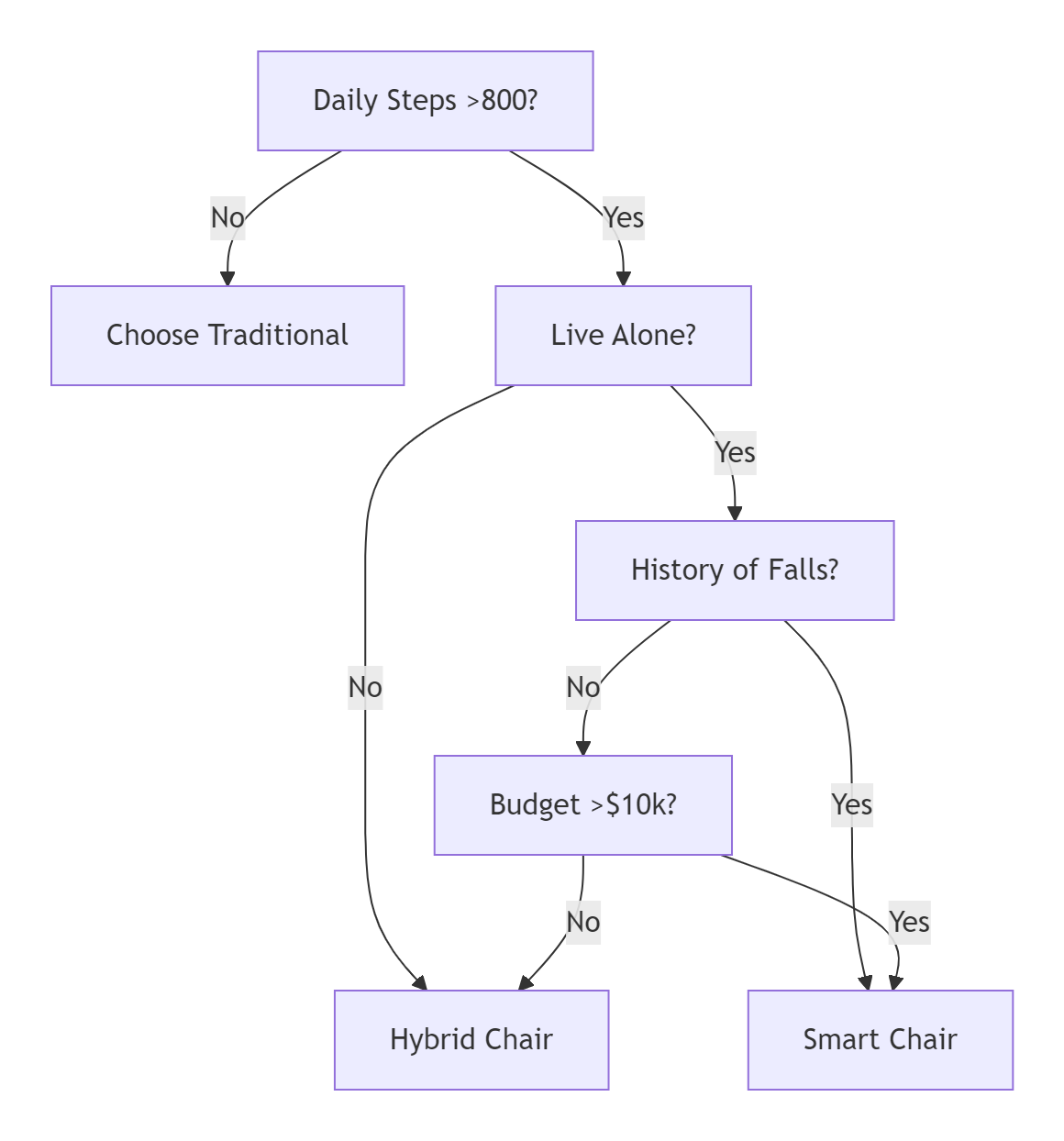
graph TD
A[Daily Steps >800?] -->|No| B[Choose Traditional]
A -->|Yes| C[Live Alone?]
C -->|No| D[Hybrid Chair]
C -->|Yes| E[History of Falls?]
E -->|Yes| F[Smart Chair]
E -->|No| G[Budget >$10k?]
G -->|Yes| F
G -->|No| DThe Verdict: Who Wins What
| Senior Profile | Recommended Chair Type | Key Features |
|---|---|---|
| Active Urbanite | Smart | Navigation, health monitoring |
| Budget-Conscious | Hybrid | Anti-tip, basic voice |
| Advanced Dementia | Traditional | Simple controls, durability |
| Post-Stroke Recovery | Smart | Voice control, fall prevention |
| Rural Resident | Hybrid | All-terrain, offline maps |
Implementation Roadmap
Phased Adoption Strategy:
- Rent Before Buying: $399/month smart chair trials
- Insurance Advocacy: Use physician’s “mobility deficit” letter
- Home Tech Prep: Install smart outlets + WiFi extenders
- Training Graduation: Bi-weekly sessions for 90 days
Medicare Hacks:
- Bill smart chair AI as “safety necessity” using code E2301
- Bundle sensors under “remote therapeutic monitoring” codes
The Independence Horizon
When 94-year-old former pilot Evelyn took her smart chair’s “voice yoke” for the first time, she whispered “Flight check complete” and rolled into the garden alone—her first unsupported outing since 2018. The chair’s log showed:
- 0.7 miles traveled
- 12 obstacles avoided
- 1 silent alert to daughter: “Mom’s cortisol dropped 38% – garden therapy working”
“True freedom isn’t walking—it’s choosing your destination.”

